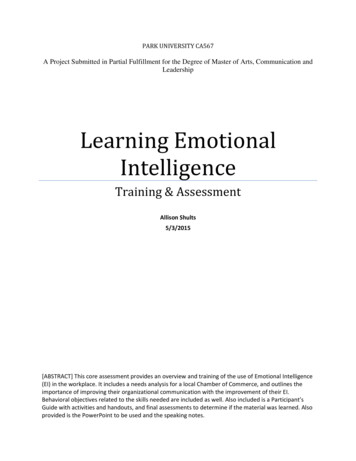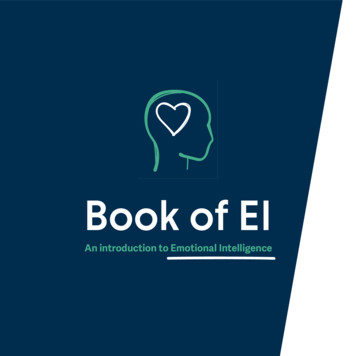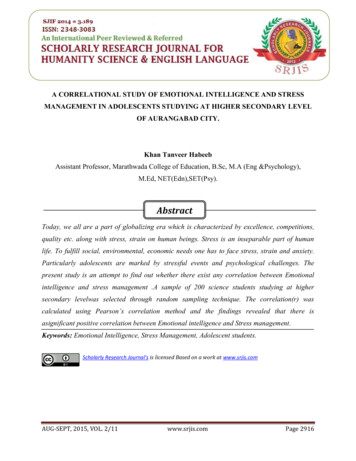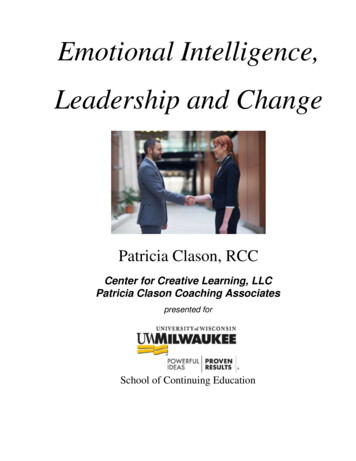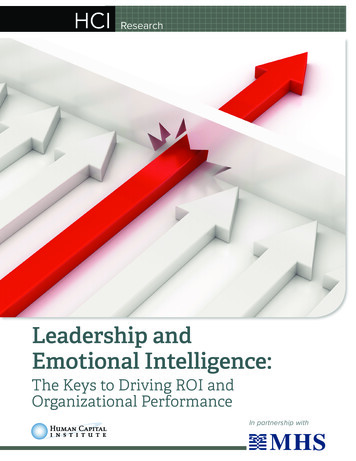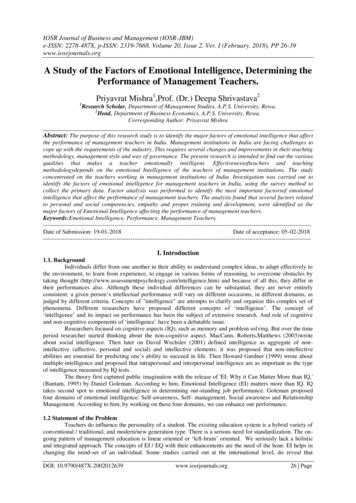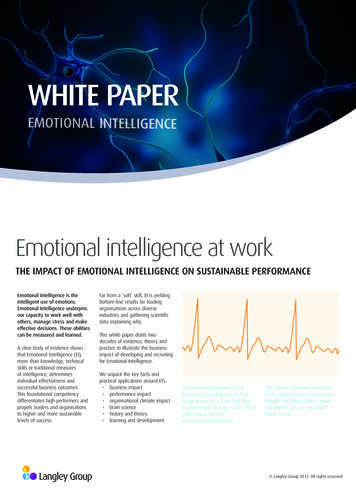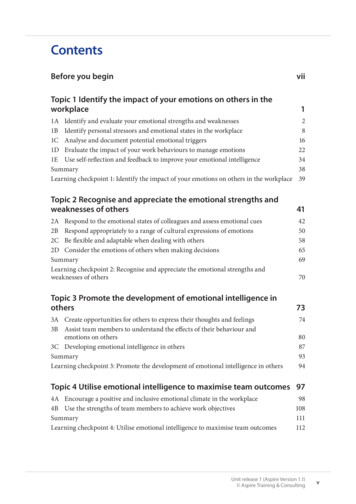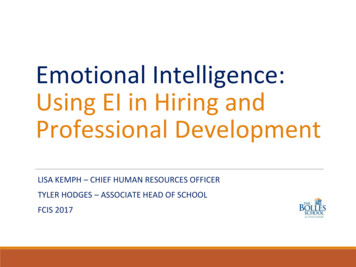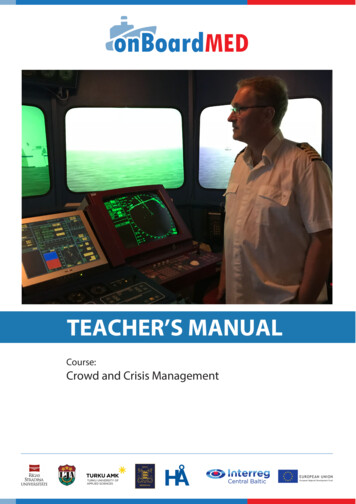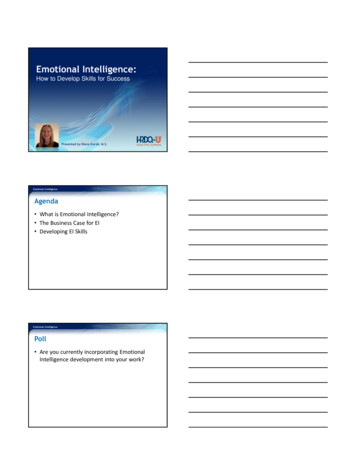
Transcription
Emotional Intelligence:How to Develop Skills for SuccessPresented by Diana Durek, M.S.Emotional IntelligenceAgenda What is Emotional Intelligence? The Business Case for EI Developing EI SkillsEmotional IntelligencePoll Are you currently incorporating EmotionalIntelligence development into your work?
Emotional IntelligencePoll Are you using a formal process to assessEmotional Intelligence?Emotional IntelligenceEmotionsDecisionsThe Decisive MoveEmotional Intelligence“Far from interfering with rationality, theabsence of emotion and feeling can break downrationality and make wise decision-makingalmost impossible. Most effective decisions areassisted by emotion.”—Antonio Damasio, Neuroscientist
Emotional IntelligenceEmotional Intelligence Is Not New1943: David Wechsler (IQ Test Developer) Non-intellective abilities (affective personalityand social factors) essential for predictingone’s ability to succeed.1983: Howard Gardner (Multiple Intelligences) Personal intelligence is as important as theintelligence measured in IQ tests.Emotional IntelligenceEmotional Intelligence: A Definition“The ability to monitor one’s own and others’feelings and emotions, to discriminate amongthem and to use this information to guide one’sthinking and actions.”Emotional IntelligenceThe Emotional Intelligence Skill llsResilience
Emotional IntelligenceLeadership and Emotional Intelligence atthe Center for Creative LeadershipSource: www.mhs.comEmotional IntelligenceAmex Example1009896949290888684828078Center Overall**LeadershipEffectiveness (asmeasured by annualEmployee Survey)20002001200220032004**Leadership Effectiveness measured according to how employees answered these questions: My leader is accessible to me when needed My leader gives me sufficient coaching and guidance My leader gives me feedback that helps me improve my performance I am appropriately involved in decisions that affect my work My leader is concerned about my personal and professional developmentEmotional IntelligenceAccounts Receivable and EmotionalIntelligence EI assessment was used to understandsuccess factors for debt collectors. Top performers collect 100% of quota; lowperformers collect 47%. New recruits (hired and trained for EIskills) achieved 163% of quota.Bachman, et al (2000): International Journal of Selection and Assessment
Emotional IntelligenceUS Air Force Saves 3 Million Emotional Intelligence assessment wasused to understand which skills predictsuccess for recruiters. Top performers achieved 100% of quotawhile low performers achieved 70%. Immediate gain was a savings of 3million annually. Retention increased 92%.Handley & Bar-On (1988): Submission to Congress, US GAO.Emotional Intelligence“No doubt emotional intelligence is more rarethan book smarts, but my experience says it isactually more important in the making of aleader. You just can’t ignore it.”—Jack Welch, former CEO of General ElectricEmotional IntelligenceSelf-AwarenessA program on emotional intelligence has tostart with building an awareness of your ownemotions—not only recognizing what youare feeling, but why you are feeling it. Youneed to be able to do this in the moment,not afterwards.
Emotional IntelligenceRecognize Your Physical Cues Increased heart rate Butterflies Flushed skin Tense muscles Sweating Voice rising, getting louderEmotional IntelligenceEmotional HijackingAn emotional hijacking may hinder you fromchoosing an effective response, action, ordecision. To prevent this from happening, youmust take some time to recognize the cuesthat your emotions are taking over.Emotional IntelligenceAnalyze Your Thinking Consciously stop toevaluate thinking. Ask three questions:– “What am I feeling?”– “What do I want tofeel?”– “What do I need tofeel that way?”
Emotional IntelligencePreventing Emotional HijackingActivity:Quick visualization, combined withdeep breathing, will go a long waytoward giving you time to catch upwith your emotions and consciouslydecide how to respond in a particularsituation.Emotional IntelligenceIncreasing Your EmpathyIn addition to recognizing and managing yourown emotions, another goal of emotionalintelligence is to develop more positiverelationships with others at work.Connecting with another person on anemotional level allows you to develop ameaningful, trusting relationship.Emotional IntelligenceDemonstrating Empathy Don’t: offer advice,judge, tell them howto feel Do: be understandingwithout necessarilyagreeing Do: use words andgestures to show youcare
Emotional IntelligenceCultivating Different Perspectives Listen to people who disagree with you. Eliminate “either/or” thinking. Question yourself. Play devil’s advocate. Look from differentaltitudes. Use intuition and logic.Emotional IntelligenceEmotional IntelligenceIncreasing Self-Confidence Remind yourself of pastsuccesses. Identify your strengths. Take a risk.
Emotional IntelligenceIncreasing Self-Confidence Change your self-talk. Think positive and in the present tense.– Change “I can’t” to “I can.”– Change “problem” to “challenge” or opportunity.”– Change “have to” to “want to.”Emotional IntelligenceDevelop a Positive Disposition Permanence: Setbacks are temporary andpositive events are permanent. Pervasiveness: Setbacks arecompartmentalized. Personalization: Positive events due topersonal ability; negative events due toexternal circumstances.Emotional IntelligenceHow to Develop an Optimistic Outlook Use healthy self-talk. Keep a gratitudejournal. Minimize negativeinfluences. Act “as if.” Exercise your sense of humor.
Emotional IntelligenceThank YouDiana Durek, M.S.Leadership and Executive DevelopmentConsultantdiana.durek@gmail.com
Emotional Intelligence "No doubt emotional intelligence is more rare than book smarts, but my experience says it is actually more important in the making of a leader. You just can't ignore it." —Jack Welch, former CEO of General Electric Emotional Intelligence Self-Awareness A program on emotional intelligence has to
